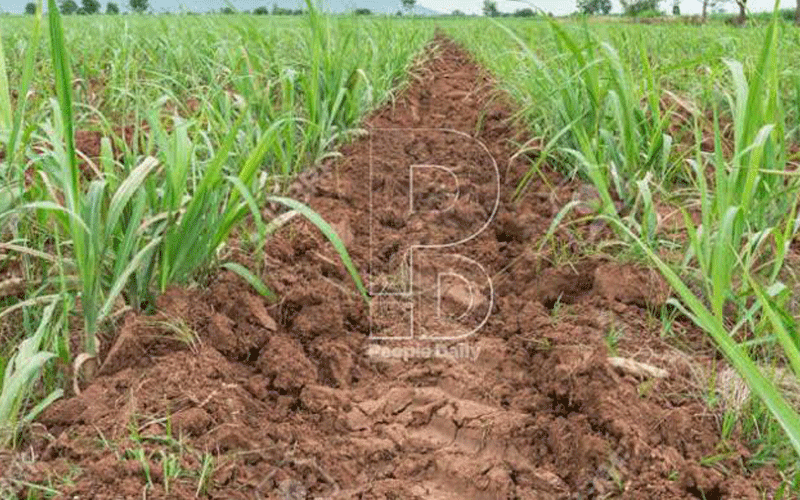Bitter news as team hints at zoning of sugarcane farming

Sugar sector continues to face numerous challenges which threaten to bring it down even as farmers now say a draft report to salvage the sector has “sneaked in” the issue of zoning sugarcane farming, despite opposition.
A report from a 16-member government taskforce appointed in 2018 to investigate the sector crisis and propose ways to revive sugarcane farming, is said to have settled for zoning as part of the solutions.
It has reportedly recommended setting up of five zones across the country, where farmers can sell their produce to any miller but the specified areas.
Kenya Sugar Cane Growers Association (KESGA) secretary general Richard Ogendo has, however, described the proposed establishment of cane catchment areas as “mischievous” and meant to benefit importers who are bent on ensuring the sector’s downfall.
“It was a waste of tax payers’ money for the government taskforce to go round the country and collect views of the farmers if they knew they had a pre-determined outcome suited for some few selfish individuals,” he said.
Kenya National Federation of Sugarcane Farmers (KNFSF) National Treasurer Stephen ole Narupa said they will oppose any move to tie farmers to specific mills, adding: “We will not allow the taskforce to introduce what was not agreed on during our meetings.”
Sugarcane shortage
The taskforce report which comes out amid an acute sugarcane shortage crisis among sugar factories in western Kenya threatening continued operations of sugar factories in the region, proposes that farmers be set free to enter into contracts with any miller within their clustered zones.
Business Hub has learnt that most millers have for the first time in history started importing raw material from neighbouring Uganda to sustain them due to reduced local production.
Ruthless brokers have also emerged to help smuggle sugarcane from Uganda through hundreds of “Panya” routes along the common border with Kenya. The contraband sugar cane is sold to millers who are hungry for them.
The outgoing KESGA chairman Ibrahim Juma confirmed the crisis, saying millers have opted to import the raw material from Uganda through the official border points in Busia and Malaba and also buy from brokers to keep the operations going.
“Our millers are facing a major crisis because sugarcane production by our local farmers has been steadily declining over the last five to 10 years,” he added.
Juma said the situation was worsened five to six years ago when reckless poaching of raw material that had also never been witnessed in the history of sugarcane production hit the sector.
He said: “The other major problem arose from the scrapping of the Sugarcane Development Levy which automatically meant that there was no money for sugarcane development programmes and many potential sugarcane farmers cannot afford it because of the high costs involved.”
Investigations have established that the millers are buying the sugarcane from Ugandan farmers in Busoga, Bugiri, Tororo and Busia districts at Sh3,500 per tonne before ferrying it across the border to their factories while brokers bought it at as low as Sh3,000 and selling it to desperate millers at as high as Sh4,450 to Sh5,000 per tonne.
The brokers smuggling the raw material prefer “Panya” routes to avoid paying taxes to Kenya Revenue Authority (KRA) and delays in clearing processes by officials of the authority posted at the border points.
Among the factories, the worst hit is the newest factory in the region, Busia Sugar Industries which for a long time was embroiled in legal tussles that pushed it to halt its operations , a situation that forced the government to intervene.
Managing Director Taib Ali said the firm has no option but look for sugarcane from alternative sources to stay in business otherwise it will be compelled to close down like Mumias Sugar did.
“Our installed production capacity is more than 3,500 tonnes of cane per day but we are operating way below that because there is no cane,” he added.
Ali said the legal tussles had also adversely affected the company’s sugarcane development programmes with local farmers since they could not continue even with the construction of the Sh6 billion factory at Busibwabo area in Busia County.
“The farmers we had contracted to grow the raw material for us with our assistance were forced to sell their sugarcane to other millers when the crop matured and were crippled by legal problems executed by some of our rivals,” he added.
The miller confirmed that it took the intervention of President Uhuru Kenyatta and his Deputy William Ruto to force the competitor to withdraw the cases against it before they could start processing sugar in 2018.
He said by then planned company’s schedule to start sugar production had been delayed by nearly two years forcing it to also halt sugarcane development programmes with local contracted farmers until the pending court challenges were over.
The other sugar millers that have been adversely hit by cane shortage crisis include Nzoia Sugar Company in Bungoma County, West Kenya Sugar popularly known as Kabras Millers and Butali Sugar Company, all in Kakamega County in Western Kenya.
Transport costs
West Kenya Sugar Managing Director Manvir Baryan said apart from being forced to import sugarcane from Ugandan farmers, we are also forced to buy it from far away farmers in the former Nyanza province and transport over long distances for processing at its factory located in Kabras area of Kakamega County.
Baryan said the problem had also sharply increased the millers’ transport costs because of the long distances involved in transporting the raw material to the factories for processing including hiring personnel to the ground to look for it and negotiate for purchasing from willing cane farmers.
He said there were also the high risks of accidents because they have to use huge heavy duty trailer trucks plying through highways congested with heavy traffic including breakdowns while the trucks are in transit with cane cargo.










